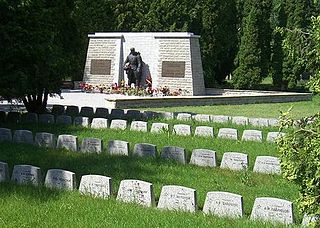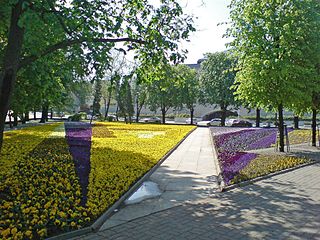
Smelting is a process of applying heat and a chemical reducing agent to an ore to extract a desired base metal product. It is a form of extractive metallurgy that is used to obtain many metals such as iron, copper, silver, tin, lead and zinc. Smelting uses heat and a chemical reducing agent to decompose the ore, driving off other elements as gases or slag and leaving the metal behind. The reducing agent is commonly a fossil-fuel source of carbon, such as carbon monoxide from incomplete combustion of coke—or, in earlier times, of charcoal. The oxygen in the ore binds to carbon at high temperatures, as the chemical potential energy of the bonds in carbon dioxide is lower than that of the bonds in the ore.

Tallinn is the capital and most populous city of Estonia. Situated on a bay in north Estonia, on the shore of the Gulf of Finland of the Baltic Sea, Tallinn has a population of about 457,000 and administratively lies in the Harju maakond (county). Tallinn is the main governmental, financial, industrial, and cultural centre of Estonia. It is located 187 km (116 mi) northwest of the country's second largest city, Tartu; however, only 80 km (50 mi) south of Helsinki, Finland, also 320 km (200 mi) west of Saint Petersburg, Russia, 300 km (190 mi) north of Riga, Latvia, and 380 km (240 mi) east of Stockholm, Sweden. From the 13th century until the first half of the 20th century, Tallinn was known in most of the world by variants of its other historical name Reval.
T1, T01, T.1 or T-1 may refer to:
Forum or The Forum may refer to:
Est, EST, est, -est, etc. may refer to:

Patina is a thin layer that variously forms on the surface of copper, brass, bronze, and similar metals and metal alloys, or certain stones and wooden furniture, or any similar acquired change of a surface through age and exposure.

Sillamäe is a town in Ida-Viru County in the northern part of Estonia, on the southern coast of the Gulf of Finland. It has a population of 12,439 and covers an area of 10.54 km2. Sillamäe is located at the mouth of Sõtke River. Its population is predominantly Russian-speaking.
Pegasus was a winged horse sired by Poseidon in Greek mythology.
Ararat or in Western Armenian Ararad may refer to:
Copper is a chemical element with symbol Cu and atomic number 29.
Tallinn University is a public research university in Estonia. Located in the centre of Tallinn, the capital city of Estonia, Tallinn University is one of the three largest institutions of higher education in the country. Both QS World University and Times Higher Education rankings place it among the top 1000 universities in the world.

The Bronze Soldier is the informal name of a controversial Soviet World War II war memorial in Tallinn, Estonia, built at the site of several war graves, which were relocated to the nearby Tallinn Military Cemetery in 2007. It was originally named "Monument to the Liberators of Tallinn", was later titled to its current official name "Monument to the Fallen in the Second World War", and is sometimes called Alyosha, or Tõnismäe monument after its old location. The memorial was unveiled on 22 September 1947, three years after the Red Army reached Tallinn on 22 September 1944 during World War II.

Tõnismägi is a 36-metre high hillock adjacent to Toompea hill in Tallinn, Estonia.

Kesklinn is one of the 8 administrative districts of Tallinn, the capital of Estonia. It is situated on the Tallinn Bay and bordered to the northwest by the district of Põhja-Tallinn, to the west by Kristiine, to the southwest by Nõmme, to the east by Lasnamäe and Pirita, and to the south by Rae Parish, beyond Lake Ülemiste. The island of Aegna, located in the Tallinn Bay, also falls within this administrative district. Kesklinn has an area of 30.6 km2 (11.8 sq mi) and a population of 57,731 ; population density is 1,886.6/km2 (4,886/sq mi).
August is both a given name and surname developed from the Latin, Augustus. Derived from the Latin word augere, meaning "to increase", Augustus had the meaning "esteemed" or "venerable" and was a title given to Roman emperors.
Mati Karmin is one of Estonia's most renowned contemporary sculptors. His career as an artist is characterised by an intense and remarkably versatile activity. Like many of his contemporaries, the representatives of so-called 1980s generation in the Estonian art, Karmin received professional training in the Estonian Academy of Art, which was thorough, yet traditional, not to say conservative according to the international criteria. During his studies, Estonian sculpture was predominantly figurative and employed traditional materials like stone and bronze.
Liiva may refer to several places in Estonia:
Panter is a surname. Notable people with the surname include:

Uno Loop was an Estonian singer, musician, athlete, actor, and educator. Loop's career as a musician and singer began in the early 1950s. He performed with various ensembles and as a popular soloist beginning in the 1960s. In his youth, he trained as a boxer, and became the 1947–48 light-middleweight two-time Estonian Junior Champion. Later, he trained as a triathlete. Between the late 1950s and the early 1990s, he taught music, voice and guitar. Loop also worked as an actor, and appeared in several films beginning in the 1960s and in several roles in Estonian television series.

Arlet Levandi is an Estonian figure skater. He is the 2022 Tallink Hotels Cup champion and a two-time Estonian national silver medalist. At the junior level, he is the 2022 European Youth Olympic Festival champion, the 2021 JGP France II silver medalist, the 2021 JGP Slovenia silver medalist, and a 2020 Winter Youth Olympic champion in the team event. Levandi is the first men's singles skater from Estonia to win a Junior Grand Prix medal.








